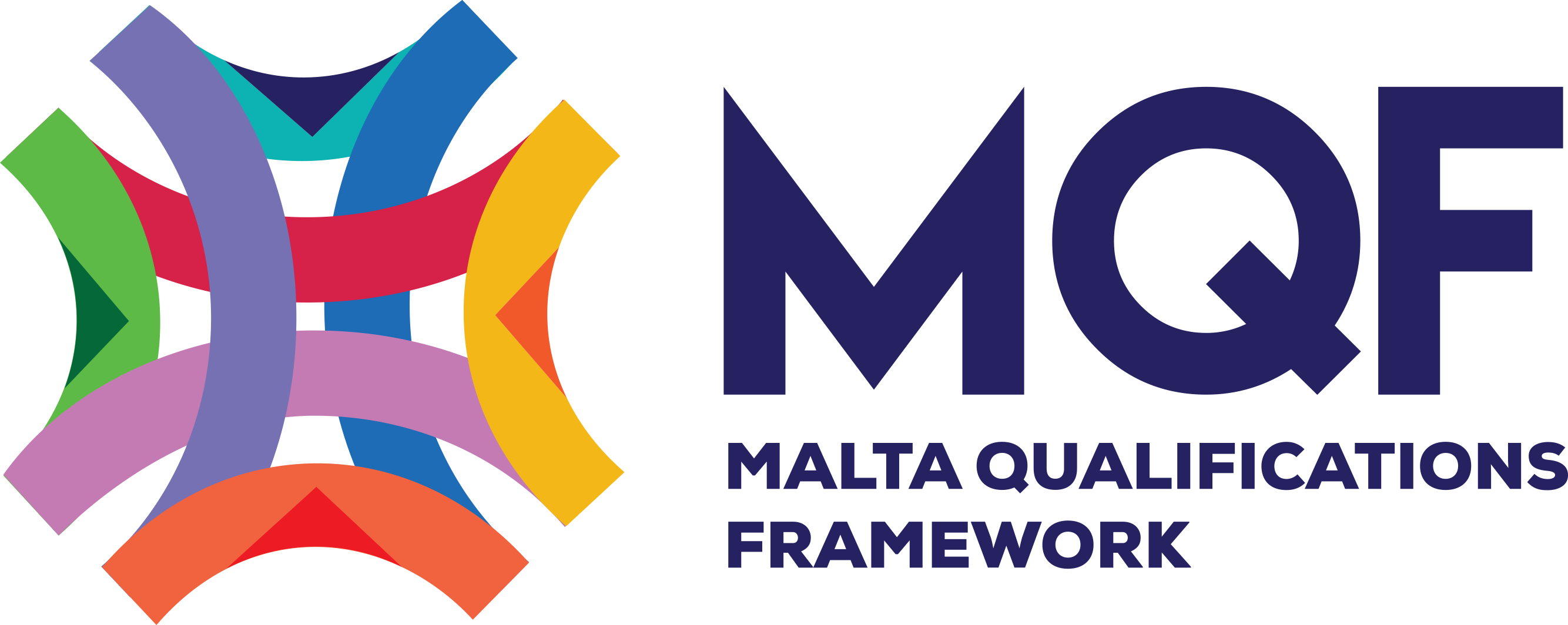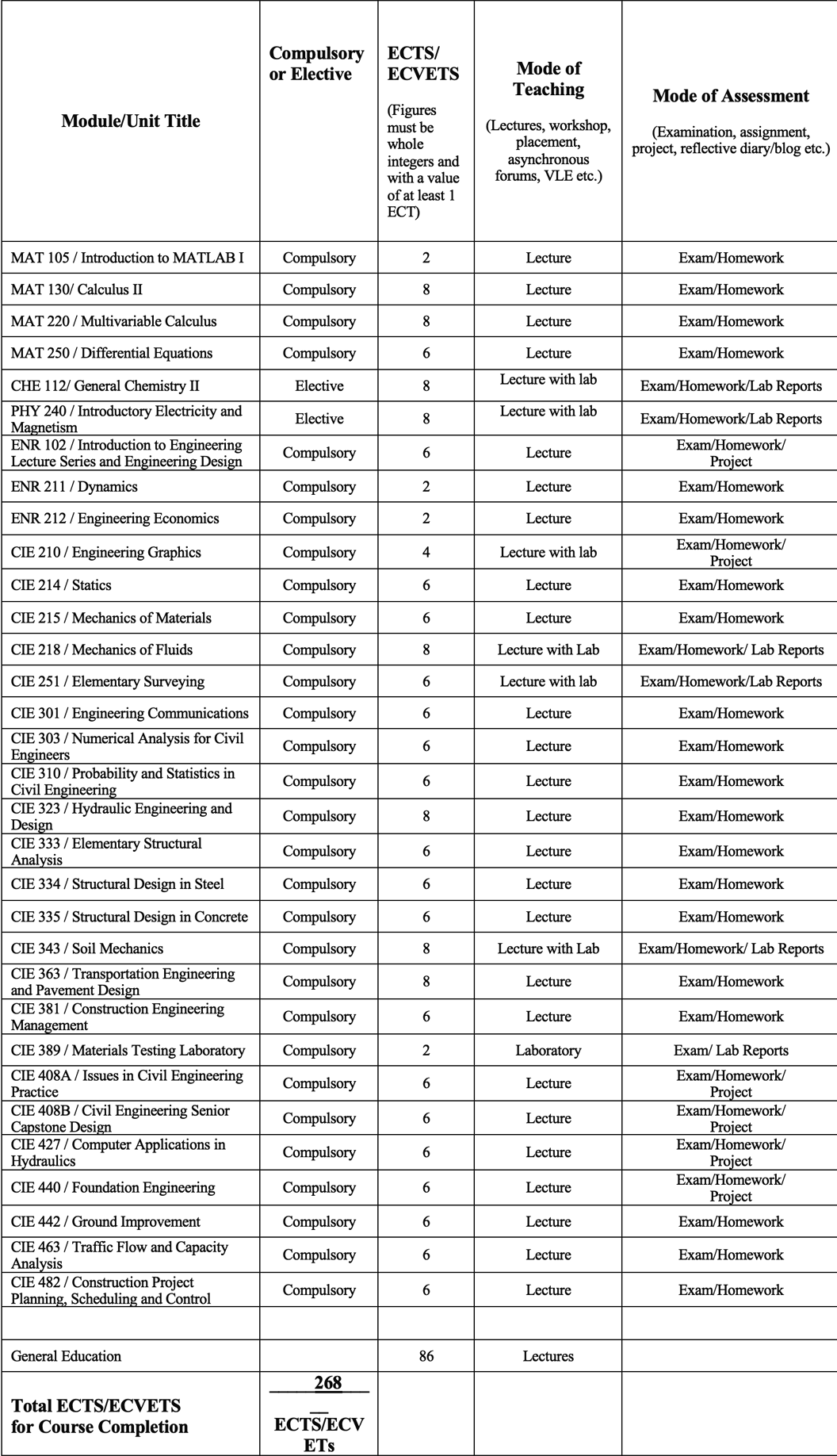BSc in Civil Engineering

Degree Overview for Civil Engineering
As cities become larger, the demands for civil engineering infrastructure increase. Malta and much of the world are renewing or expanding their transportation, water supply, wastewater treatment, flood control, buildings and other infrastructures that support and enhance the quality of life in their communities. These systems must be designed for safety and economically satisfy community objectives including sustainability and resilience. Training of engineers with the skills to design, maintain and operate these infrastructure systems is specialized and requires a minimum of Bachelor of Science degree to gain that competence. This course fulfills those training needs and meets a regional demand.
Entry Requirements for this Program
Entry Requirements for this Program
Materials required in the undergraduate admissions application:
Official AUM application – Personal statement · Secondary school transcript – Minimum of grades 10 and 11 – Documents should be in English – Official transcript and diploma must be presented before course commences · Teacher or counselor recommendation letter · ACT* or SAT* results (for students from the United States of American) · Proof of English Proficiency (for students who did not graduate from a secondary school using English as a medium of instruction). Acceptable proof of English proficiency includes: – IELTS – TOEFL – ACT* or SAT* English/reading score results
Other forms can be decided on a case-by-case situation Undergraduate Admission Requirements · 12 years of schooling expected · Secondary school completion, which can include:
High School Program § 80% or above for grades 10 and 11 in a US system or the equivalent standards in other countries – IB Certificate – GCSE/IGCSE (General Certificate of Secondary Education/International GCSE) § Five subject exams with grades of D or above on each § A/S or A Levels with a minimum of D – For Maltese secondary (sixth form) schooling: § Matriculation certificate · 5 or above in English and Mathematics § A/S or A Levels: three subject exams with a minimum of D – Other school leaving certificate may be considered § Can include IB, AP, or EB · Proof of English Proficiency (for students who did not graduate from a secondary school using English as a medium of instruction).
Acceptable proof of English proficiency includes: – IELTS minimum of 6.0 – TOEFL § 550 minimums for paper based § 79 minimum iBT § 213 minimum cBT – ACT or SAT English score results § ACT reading 18 or above and 20 or above in English § SAT reading and writing score of 550 or above – IGCSE English as a second language § Grade C or above – Other forms can be decided on a case-by-case situation.
Admissions decisions are based equally on the above requirements as follows: · 25% on the student high school averages in grades 10 and 11 · 25% on the English proficiency test and/or on the SAT or ACT · 25% A consideration of personal qualities and academic motivation, as determined in the completed application and personal statement · 25% recommendations from teachers and school counselor Work Experience: It is possible that in a particular case a student who does not meet the required minimum grades may be admitted if he or she has significant related experience in a particular field of at least 2 years.
Additional requirements: Please note that the admissions requirements for specific degree programs may be higher than the general requirements indicated here. For example, degree programs in Engineering require: · IELTS score of 6.5 For Engineering Students from the British System: · A level A2 mathematics · BBB at A Level · GSCE: Science C. · At least one other Science/Technology subject (or equivalent qualification) from the following: Electronics, Materials Science, Physics, Biology, Chemistry, Geology, IT, Further Mathematics, Mechanics, Dynamics or General Engineering. · Minimum grades at GCSE and AS level are set at C · Other suitable skills or experience gained in a relevant industry may be considered.
*The ACT and SAT can be done several times and the highest scores from each section will be used. Conditional admission is offered for applicants who meet all requirements except English proficiency. Conditional admits must enroll as full-time students in the AUM English for Academic Purposes program. The minimum English Proficiency scores for conditional admits is 4.5 IELTS for undergraduates (or equivalent) or 5.5 IELTS for graduate students (or equivalent).
Program Details
Program length:
48 Months.
GPA needed to earn the degree:
2.0 or higher
Credits needed to earn the degree:
134 US credits / 268 ECTS
Degree level:
MQF Level 6
Pass Rate:
73%
Overall Course Objectives
As a result of input from our constituents, the Civil Engineering Program objectives and indicators are:
- Objective 1: Technical Proficiency. Building on fundamental knowledge, graduates will develop technical skills within and across disciplines in civil engineering and/or in closely related fields.
- Objective 2: Professional Growth. Graduates will develop and exercise their capabilities for life-long learning as a means to enhance their technical and non-technical skills.
- Objective 3: Management Skills. Graduates will develop and refine their knowledge and skills for management, communications, and professional ethics.
Program Learning Outcomes
Learning Outcomes for Communication Skills for the whole course,
The learner will be able to:
a) prepare professional proposals and reports
b) competently deliver oral presentations to technical and lay audiences
c) develop and use effective audio/visual aids
d) write effective professional communications such as email and memorandums
e) communicate within the engineering disciplines through plans and drawings
Learning Outcomes for Learning to Learn Skills for the whole course,
The program must have documented student outcomes that support the program educational objectives. Attainment of these outcomes prepares graduates to enter the professional practice of engineering. Student outcomes are: (a) an ability to apply knowledge of mathematics, science, and engineering (b) an ability to design and conduct experiments, as well as to analyze and interpret data (c) an ability to design a system, component, or process to meet desired needs within realistic constraints such as economic,environmental, social, political, ethical, health and safety, manufacturability, and sustainability (d) an ability to function on multidisciplinary teams (e) an ability to identify,formulate, and solve engineering problems (f) an understanding of professional and ethical responsibility (g) an ability to communicate effectively (h) the broad education necessary to understand the impact of engineering solutions in a global, economic, environmental, and societal context (i) a recognition of the need for, and an ability to engage in life-long learning (j) a knowledge of contemporary issues (k) an ability to use the techniques, skills, and modern engineering tools necessary for engineering practice.
General Pedagogical Methods used for this Program
Modules will be taught in traditional lecture and flipped classroom models. The flipped classroom model will be applied for approximately half of the program coursework. Here, prior to attending class, students will view a set of recorded short lectures and take quizzes on that material. Lecture material will incorporate materials for various learning styles and take advantage of visualisation opportunities readily available in this mode. Students will then attend classes that are led by an on-site instructor who may clarify concerns on the material. The emphasis, however, is to lead in-class exercises that will cater to different learners through student-led exercises (problems, design projects, instructing on software, discussions, etc).
Often these sessions will be in a collaborative learning environment in which students work in small groups. In special cases, the instructor will provide supplementary lecture material. Out of class reading and homework assignments will then be assigned, submitted and graded. Students also have the opportunity to engage in one-on-one instruction through office hours. The remainder of the coursework will be taught in a standard classroom mode of lectures with outside of class exercises, homework and projects. In this mode, lectures will be provided during class periods. Lectures will incorporate materials different learning styles and may include example and/or student or instructor-led problem solving. Office hours and, for some courses, problem recitations will be held to reinforce learning. Laboratory courses involve two to three-hour laboratory sessions in which students complete assignments involving hands-on laboratory experiments and supplemental data analysis either individually or as part of groups. Laboratories are assessed using written lab reports and/or oral presentations.
General Assessment Policy and Procedures
Assessments Engineering disciplines require strong mathematics skills. Assessments (in-class examinations, homework and individual and team projects) will focus on those skills. In general, grades will be assigned based on performance on those assessments. Students with learning disabilities will be addressed by providing additional time or quiet settings for examinations for those students as determined appropriate. Cheating and Plagiarism Exams will be administered in classroom settings by the on-site co-professor. Appropriate identification will be required. Class notes or limited sets of materials may be available to students during exams. Only simple calculators without memory cards will be permitted to avoid students bringing additional materials to assessments. The plagiarism tool, Turn-it-in, will be applied to document reports and papers are not copied from other sources without proper citation.
Relationship to Occupation/s
Civil engineers plan, design, develop and manage projects for the construction or repair of buildings, earth structures, powerhouses, roads, airports, railways, rapid transit facilities, bridges, tunnels, canals, dams, ports and coastal installations and systems related to highway and transportation services, water distribution and sanitation. Civil engineers may also specialize in foundation analysis, building and structural inspection, surveying, geomatics and municipal planning. Civil engineers are employed by engineering consulting companies, in all levels of government, by construction firms and in many other industries, or they may be self-employed. This program provides a fundamental background in all civil engineering subdisciplines: construction, environmental, geotechnical, hydraulics, structures and transportation engineering. Graduates will be prepared to immediately contribute in professional practice in those subfields in entry level engineering positions. In Malta, engineering is a regulated profession in the interest of public health, safety and security. In most countries, civil engineering is a regulated occupation. This course will prepare students for licensure.
Program Structure Sample
